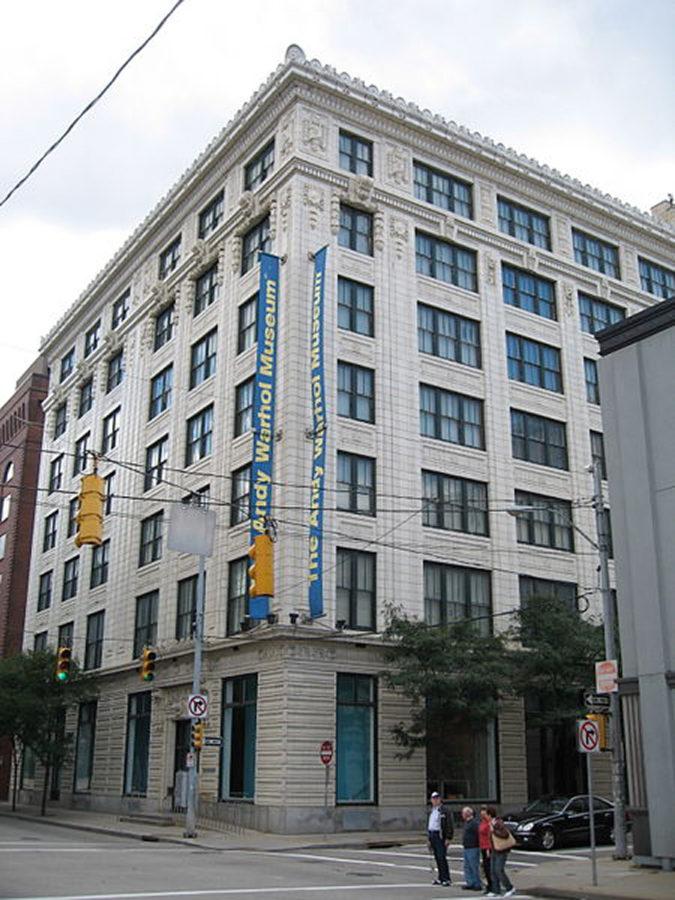Donald Warhola talks art and Uncle Andy
Andy Warhol’s nephew leads gallery talks at the museum standing in honor of his uncle’s timeless art.
August 29, 2018
Guests can stop by the Andy Warhol Museum on any given day and wander through rooms occupied by the imaginings of an artist whose work spans across a multitude of mediums. But it’s only on Tuesdays and Wednesdays that guests can peer into the personal life of a cultural icon with the help of his nephew.
Donald Warhola’s gallery talk in the museum was supervised by a larger-than-life high school yearbook photo of Andy. Warhola likes to keep things informal and invites guests to ask questions throughout.
Today, Warhola — who graduated from Pitt in the 1980’s with a degree in computer science and business — spends much of his time working with adolescents who have special mental health needs, as he is now a licensed clinical social worker. Warhol brings these skills to his position at the museum in various ways like holding an outreach program for children with autism and running a workshop called “The Caring Place” for children who have recently lost loved ones. However, the gallery talks are one of his most popular endeavors at the museum.
Warhola shares with museumgoers his memories of Andrew Warhola, the uncle whom he frequently visited in New York bearing clothes and even celebrity anecdotes — only after his nephew asked him things such as what Sylvester Stallone was like. Warhol didn’t brag much about his famous acquaintances.
Guests from both the Steel City and out of town were excited to hear Warhola’s words on his famous uncle. One such guest, California native Bob Kurcz, stopped by on his 15-month tour of North America.
“[Warhola] loves to talk and that’s a great thing for what he’s doing here. He answered my questions, so I was grateful,” Kurcz said.
One would be more likely to guess that Warhola was a computer scientist than the nephew of an art mogul. Dressed conservatively in blue jeans and a white button-up, Warhola sports a shaved head — something his uncle refused to have.
The talk ran overtime, as there were many guests eager to pick Warhola’s brain. He happily answered many questions from the curious guests. He’s gotten used to fielding questions since he assumed the role of liaison for the museum and The Andy Warhol Foundation for the Visual Arts.
“Basically, people really like to hear that information about the human side of Andy Warhol, so I always try to include that — my relationship with my uncle,” Warhola explained.
When asked what some of his favorite art pieces are, Warhola talked about his partiality for his uncle’s later work.
“I believe it got much more personal in the ’80’s. By that time, I believe he felt like ‘I made it. I’ve accomplished what I wanted to as an artist and now I can kind of sit back and just be myself as an artist and not worry about painting this for that person. I’m going to paint what I want to paint,’” Warhola said.
Warhola enjoys engaging in dialogue with the guests. A tourist from Eastern Slovakia, Eva Varga, discussed the significance of Warhol’s work within American society at the time.
“I was talking about this with [Warhola]. I can see that his work was really a product of the liberty of the United States. If his parents had stayed back at home, in Eastern Slovakia, this couldn’t have happened. I know, because I come from Eastern Slovakia, that the mentality is very much closed and traditional,” Varga explained.
Varga didn’t know much about Andy Warhol, so she felt obliged to check out the museum while she was in town. Some of her preconceived notions were proven wrong.
“I really liked the picture of his apartment. Seeing that he collected antique stuff, I would have imagined that his apartment would be filled with something new, something modern, but no,” she said.
Donald Warhola was 24 years old when his uncle passed away. Warhola remarked during his talk that Warhol himself seemed to reflect on his trajectory in his final years.
“There’s a work up there now, it’s stitched photos. It’s intriguing to me because it’s photos of high-end models and Uncle Andy had them sewn together,” he said. “And to me that takes his life full circle. As a child, he probably watched [his mother] sewing, patching his clothes.”
Warhola mused on how his uncle’s life seemed mirrored in his artwork.
“It’s almost like he’s making a statement. This is where I came from, sewing things together and preserving them, to photographing high-fashion models,” he said. “That was one of the last projects he was working on.”
Though the vast majority of guests never knew Warhol, Warhola understands the relationship guests build with his superstar uncle’s work. He believes Andy Warhol is so memorable because despite the quirks of his art, he presents it to people in a way that allows them to make connections to their own lives.
“Take the Campbell’s soup can for example, one his most famous works. We’ve all had our experiences, good, bad and ugly, with Campbell’s soup,” he said. “I know when I was in college, I ate a lot of soup, so it’s artwork that people can create their own narrative to. It’s almost like he presents the object and you complete it with your personal experience.”



